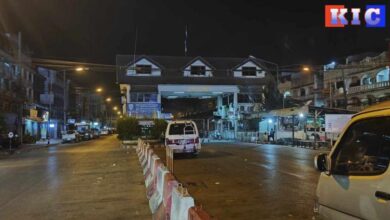Released Political Prisoners face huge problems

In an exclusive interview with Karen News, Ko Bo Kyi, a founding member and joint-secretary of the Assistance Association for Political Prisoners (AAPP), outlined his concerns over Burma’s on going reform process and the treatment of current and former political prisoners inside Burmese prisons.
According to the AAPP in the last two years around 1,000 political prisoners have been released, but release from prison is often just the start of a long and difficult process towards civilian life.
Ko Bo Kyi explained that released political prisoners are under supported by NGO’s and their efforts to reintegrate into society are being thwarted by Burma’s hostile government.
“Former political prisoners find it extremely difficult to readjust to civilian life,” Bo Kyi told Karen News. “In prison you are far away from the modern world. Your family is not rich, they are very poor and they cannot support you regularly. It is really difficult.”
Bo Kyi was jailed three times for a total of seven years and three months. Since his release from jail in 1998 Bo Kyi has been a leading figure campaigning to free all of Burma’s political prisoners. His work has been recognized by the New York based Human Rights Watch who honored Bo Kyi with its Human Rights Defender award.
Bo Kyi said that recently released political prisoners are often denied access to their former jobs, whether they be lawyers or students, as the government refuses to give them a license due to their past political affiliations.
“Some are in prison for 10 or even 20 years,” he said. “Some of them even though they are physically good they suffer from mental illness – they really committed their life to democratic changes.”
Former political prisoners rejected by NGOs
AAPP is based on the Thai-Burma border and works for the release of all political prisoners in Burma and for improvement in the country’s notoriously bad prison conditions.
Bo Kyi says large non-government -organisations and the UN are reluctant to hire former political prisoners, in case they ‘upset’ the government.
“It is regretful that UN agencies are hesitant to appoint former political prisoners in their departments in Burma because they do not want to receive any pressure from the government.”
Bo Kyi was also critical of non-government organisations for not employing qualified former political prisoners.
“Very few NGO’s help. The majority do not think to help former political prisoners. They have no agenda for that. Because they are too careful of the government, they do not want any complaint from the government. So staying away from former political prisoners is the best way for them.”
Bo Kyi said that although many famous political activists have been released, such as Aung San Suu Kyi and 88 generation leaders Min Ko Naing and Ko Ko Gyi, they have to live in a political environment that still represses basic civil liberties and face an ever present threat of being re-arrested.
“There is no rule of law in Burma,” Bo Kyi says, “even if you get a lawyer, that cannot help you much… everything is controlled by military intelligence.”
Constitutional Crisis?
Burma’s all-powerful military has ensured the drafting of the 2008 Constitution delivered it political control of the country’s parliamentary system. Political analysts have said that Thein Sein’s civilian government will lack legitimacy until the 2008 Constitution is reformed.
Bo Kyi agrees that the 2008 Constitution is a significant obstacle towards democracy and ensures that the “military stays above the law.”
“The current constitution is a real crisis for us. With this constitution we cannot go forward.”
The constitution is controversial because it guarantees a quarter of all seats in parliament to the military. It also forbids anyone from becoming president if they have family members who are foreign citizens. The exclusion provision has been seen as directly aimed at Aung San Suu Kyi whose husband was British.
“We can forgive, but never forget…”
Bo Kyi says one of the fundamental building blocks towards national reconciliation is woefully lacking. “We need truth. Truth can help reconciliation. Truth can help peace.”
“Some people were tortured to death. So the government needs to take responsibility for their actions and we need their confessions.”
Bo Kyi says that this is not just an issue for political prisoners but also all the ethnic nationalities persecuted under Burma’s vicious military junta over many decades. To Bo Kyi, Thein Sein’s government’s waging of a full-blown war in Kachin State is just another example of who holds the real political power in Burma today.
“The government should stop such kinds of civil war. That is really important. Without peace how can Burmese people living outside Burma return to their villages?”
Ko Bo Kyi said that as long as the military continues to carry out military campaigns against it’s own people – the civilian government cannot be taken seriously as a reformer.
“How can we create a democratic society if the Army is above the law?”




